

Boosting your gut health sounds great. But this wellness trend is vague and often misunderstood. If you walk down the supermarket aisle, you may be tempted with foods marketed as being good for your gut.
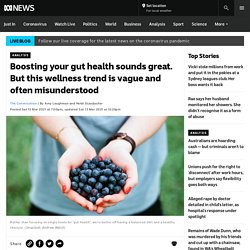
Then there are the multiple health blogs about improving, supporting or maintaining your "gut health". Nutritionists call for healthy lunch program to be rolled out in schools across Australia. If you were able to sneak veggies and wholefoods into your child's lunchbox, would they eat it over the standard packed Aussie lunch?
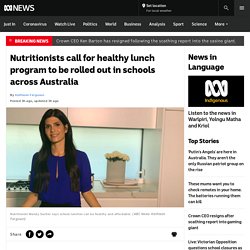
One nutritionist thinks so, and she also thinks it might be cheaper. Some research shows 40 per cent of food children eat is considered junkNutritionists are calling for a healthy lunch program to be rolled out nationwideA Darwin childcare centre says children have shown improved behaviour since it began a health program A Flinders University survey found 40 per cent of the food school children eat is junk food, such as cakes, chips and biscuits Instead of breaking the bank on superfoods or spending precious time slaving away in the kitchen, paediatric nutritionist Mandy Sacher wants people to go back to basics and avoid the usual pre-packaged school snacks.
New health star rating system ranks fruit juice below diet cola in shift to sugar-based grading. Food regulators have classed fruit juice as less healthy than diet cola under new guidelines confirming Australian health star ratings (HSR) on food packaging will focus more on sugar content.
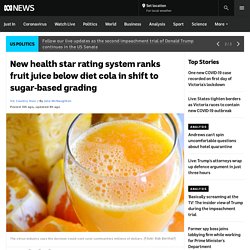
Key points: After a review of Australia's health star rating system, fruit juice will have a lower rank than diet colaAgriculture sector says the decision is "madness" and will devastate fruit growersDieticians say fruit juice is high in sugar but has more nutrients than soft drinks Friday's decision by the Australian and New Zealand Ministerial Forum on Food Regulation, made up of state and territory ministers, will reduce the five-star rating for fruit juice to as low as two stars.
Orange juice health star rating proposal provokes outcry from citrus industry - ABC News. Orange juice may be officially deemed less nutritious than diet cola if a decision to classify it alongside soft drink goes ahead.
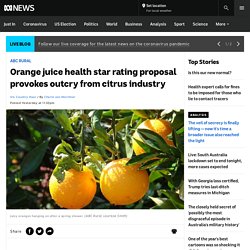
Key points: The citrus industry is concerned a Health Star Rating (HSR) drop for fresh juices will confuse customersFruit sector says possible new rating will have multi-million-dollar impactAustralia and New Zealand Ministerial Forum on Food Regulation will meet next week to review proposed HSR changes. Ban junk food ads on public transport and other WA Government property, health agencies say - ABC News. Leading health agencies including the Telethon Kids Institute and the Cancer Council want the WA Government to immediately stop advertising junk food on government property like bus shelters, billboards and next to train stations.
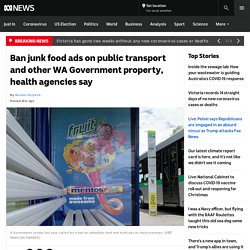
Key points: The health costs of junk food far outweigh ad revenue, the agencies sayTheir report says a quarter of WA children are overweight or obeseBut it warns opposition from industries could be a big obstacle to any ban The agencies have released a new report which says it will not only improve people's health but will help save the Government hundreds of millions of dollars over the next decade in the fight against obesity and other chronic diseases. The Cancer Council's director of cancer prevention, Melissa Ledger, said the ban would be easy for the State Government to put in place. "We really want to see the Government stop allowing junk food industries to advertise on their property," she said. Quarter of WA kids overweight or obese. Adele has sung its praises. But the Sirtfood diet may be just another fad - ABC News. The Sirtfood diet has been in the news again this week after singer Adele showed off her slimmed-down figure on US comedy show Saturday Night Live.
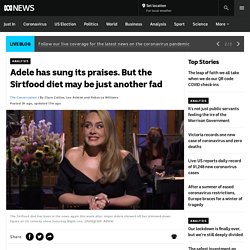
Adele has previously credited her significant weight loss to the Sirtfood diet. Following her appearance on SNL, there was a spike in people searching the diet on Google. But what exactly is the Sirtfood diet, and does it work? Soy, oat, almond, rice, coconut, dairy: Which 'milk' is best for your health? - ABC News. A trip to the supermarket presents shoppers with an overwhelming number of milk choices.
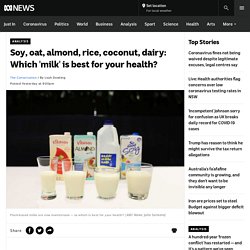
And far from just being the domain of the modern hipster, plant-based milk alternatives are going mainstream. These alternatives may be suitable for people who are intolerant to dairy milk, or have ethical or other personal preferences. They tend to be lower in saturated fats and energy than dairy milk, but also lower in protein (except soy) and calcium (unless fortified). Some are also high in added sugars. As to which milk is best, there's no simple answer. Nevertheless, the nutritional quality of the different alternatives varies considerably, so it's important to take note of these differences when making a selection. Baked beans an unlikely nutrition star, and pandemic hit - Health - ABC News. As we all fight our inner "prepper" and try not to succumb to panic buying, it seems many of us have turned to an old favourite: baked beans.
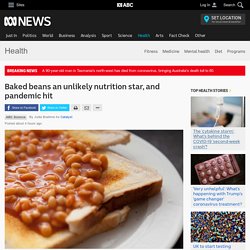
Bean production at Australia's largest fruit and vegetable cannery in Shepparton, Victoria, has doubled its usual volume to producing 500,000 cans a day. While baked beans might not look particularly sexy, they're a favourite among nutrition experts, including Clare Collins, a professor of nutrition at the University of Newcastle. "I think most people have no idea how great they are when it comes to nutrition," says Professor Collins on Catalyst's How Food Works. So what is it that makes many dietitians so keen on the bean?
And should we all be eating more of them? Easy veggies Only 7 per cent of Australian adults and 5 per cent of children eat sufficient serves of vegetables in their daily diet, according to the Australian Institute of Health and Welfare. How to cook your vegies to maintain good nutrition and support your immune system during coronavirus - Science - ABC News. Ever had a meal where the vegetables were so overcooked and tasteless that you wondered if there was any nutritional value left in them?
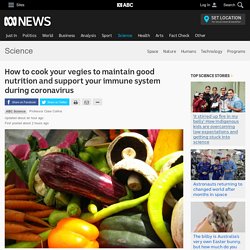
Vegies are a good source of fibre, vitamins, minerals, and a group of substances called phytonutrients or phytochemicals. Getting the most out of our vegetables is critical to support our immune system during the coronavirus pandemic. While cooking makes many vegies easier to digest, cooking them for too long at high temperatures, or with too much water turns them into a tasteless mush and leaches away nutrients.
This is especially so for vegies that contain water-soluble vitamins (vitamin C, B1, B2, B3 and folate). Growing your own food at home can be rewarding, but is it cost-effective? Updated about 4 hours agoThu 26 Dec 2019, 8:01pm Tomatoes, beans, carrots, corn.
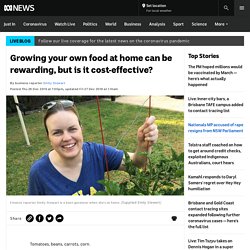
When my husband and I lived in regional Victoria, we grew it all. The soil was nutrient-rich and the sun was plentiful. The hardest part was keeping the water up on those hot blustery days. For a vegan diet to be healthy and complete, you really need to understand your food - Health - ABC News. In a world where "meat-free meat" sits next to the beef sausages in the supermarket and ordering an almond milk latte brings nary a flicker to a barista's eye, the once-fringe vegan movement seems to have gone mainstream. For the uninitiated, followers of a vegan diet eschew all animal products, including dairy, eggs, honey and, of course, meat. So for an eating pattern that cuts out so many foods traditionally considered essential, is it possible for a vegan diet to meet all your nutritional needs?
Yes, says Clare Collins, professor of nutrition at the University of Newcastle — but it requires you to understand food better than the average omnivore, or even vegetarian. Here are four main nutrients to look out for. Vitamin B12 Let's start with this one, because vitamin B12 is something we humans can really only get via animal foods — such as meat, fish, dairy and eggs — or in the form of supplements. Meat and dairy guidelines have changed. What and how much should we now eat? - Health - ABC News. Full-fat dairy can safely return to your shopping list but you might want to think about cutting back on red meat. That's according to the Heart Foundation, which earlier this week updated its guidelines of what to eat to reduce your risk of heart disease and stroke. For the first time, the health body put a specific limit on the amount of red meat Australians should consume: no more than three lean meals (totalling 350 grams) of unprocessed beef, pork, lamb or veal a week.
It's also important to limit our intake of processed or deli meats, according to Heart Foundation chief medical advisor Garry Jennings. "People should get most of their heart-healthy protein from plant sources such as beans, lentils and tofu, as well as fish and seafood, with a smaller amount from eggs and lean poultry," he said. The limit on eggs, however, has been lifted: they contain good quality protein and are a source of healthy fats. Sugar quiz: How much sugar is in our food? 10 Questions remain How much Coke can you drink before you reach six teaspoons of sugar? Teaching your kids about good nutrition? Try ditching the word 'healthy' Posted 54 minutes agoWed 17 Jul 2019, 1:34am It can be a struggle to get your kids to eat healthy food — let alone enjoy it. Many parents resort to clever recipes with hidden vegetables, so kids don't even know the delicious meal they're eating is also good for them. But maybe, says food writer and former teacher Alice Zaslavsky, we're going about it all wrong.
She says a better approach is one that focuses on "cultivating curiosity" — and teaches kids more about food than "apples are good" and "lollies are bad". The first step, she says, is to drop the word "healthy" entirely. Want an ethical diet? It's not as simple as going vegan, says farmer Matthew Evans. Updated yesterday at 4:58amWed 3 Jul 2019, 4:58am Think going vegan means no animals will die? Think again. World Health Organisation's recommendations on saturated fat are out of date, expert team says - Health - ABC News. A global team of researchers has taken aim at World Health Organisation draft guidelines that recommend people reduce their saturated fat intake, saying advice should be framed around foods, not nutrients.
Saturated fat key points. Why do we crave comfort food in winter? Analysis By Megan Lee and Jacqui Yoxall. Type 2 diabetes: How do I lower the odds of developing it when I'm 'high risk'? - Science News - ABC News. So, I sit down to research an article on diabetes and the first thing I find is an online test that offers to assess my risk of developing type 2 diabetes. What is ultra-processed food and how do I avoid it? - Health - ABC News. They're cheap to produce, designed to last for a long time without spoiling, convenient and engineered to taste delicious. But ultra-processed foods are increasingly being recognised as unhealthy — even aside from the high salt, fat and sugar content that most of them usually have.
Last month, researchers showed a cause-and-effect relationship between ultra-processed food and weight gain. A couple of weeks later, two more studies linked these foods with disease and death. Plus-size mannequin criticism ignores fact healthy bodies come in all shapes, experts say. Analysis Posted 26 minutes agoWed 19 Jun 2019, 1:29am Nike has placed a new mannequin inside its London store that has sparked outrage and debate on social media and the internet. High blood pressure is one of Australia's biggest killers, but you can take control - Health - ABC News. Meet the people learning to cull their own animals so they can feed themselves sustainably. Posted 31 minutes agoSat 1 Jun 2019, 12:21am. Menopause shifts fat to the waistline, but doesn't cause weight gain, study finds - Health - ABC News. Salmonella egg recall a reminder about hygiene but not cause for panic, scientist says. Updated 39 minutes agoThu 21 Mar 2019, 10:30pm The recall of hundreds of thousands of eggs due to the detection of salmonella should not prompt panic, but should serve as a reminder for Australians to adopt proper food hygiene practices, according to a researcher.
Complete list of recalled eggs: Asthma sufferers could benefit from eating more oily fish, researchers say. Updated 16 minutes agoMon 18 Mar 2019, 10:02pm Oily fish such as salmon and sardines have long been classed as a superfood staple, and now new research suggests they could also help prevent asthma. The community food co-op feeding one of Tasmania's most disadvantaged suburbs. Is moderate drinking good for you? Veganism becomes more mainstream — but don't mention the 'V' word. 'Super' foods are often nothing of the sort, Queensland nutritional researchers find. Giant cabbage that had grower eating coleslaw for weeks attracts global attention. Will eating nuts make you gain weight? Why teens are resorting to drastic weight loss surgery to combat obesity.
Food allergies are all too common in Australia, but there are ways to help avoid them - Science News - ABC News. What's in our kids' lunch boxes? Almond, soy or coconut? How plant-based milks compare to regular dairy - Health - ABC News. Healthy foods can help prevent and treat depression. What if the benefits of breakfast are just another diet myth? Why the Western diet needs to shift to a 'planetary health diet' in the age of climate change. Soft drinks targeted with graphic images of tooth decay in new health campaign. What you need to get your recommended intake of fruits and vegetables. 'Adventurous' consumers and plant-based products among food trends in 2019. Double-dipping more of a food safety risk than invoking the five-second rule, expert says. Sailors, sauerkraut and PTSD: Exploring the link between gut bacteria and mental health.
President Abdel Fattah el-Sisi tells Egyptians to lose weight, and TV to snub those 'overweight' 'Food deserts': Grocery dead zones have serious health impacts for residents, experts say. UK teen's allergy death prompts warning for Australians. Fluoride level of Alice Springs water called to account for heightened cases of child tooth decay. The jury is still out on whether omega-3 supplements reduce heart attacks.